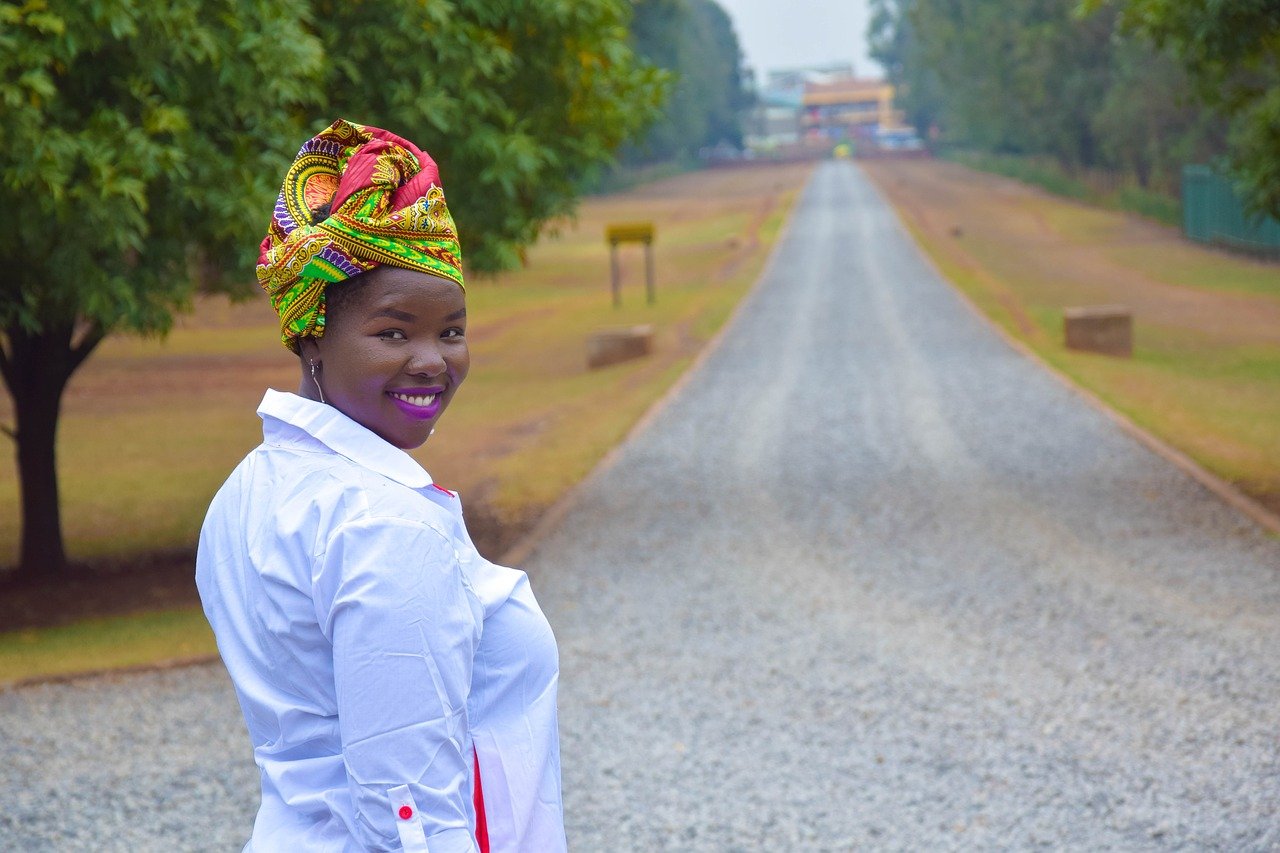Nguo: Clothes in Swahili
In this post we’ll learn lots of vocabulary to help you talk about clothes in Swahili. First we’ll learn the basics with a lot of general vocabulary for clothes in Swahili. Then we’ll learn vocabulary for professional and formal clothing. After that we’ll look at vocabulary for clothes that you’d wear in cold or hot weather. After that we’ll learn Swahili vocabulary for shoes and then underwear. Finally we’ll learn Swahili vocabulary for talking about how clothes fit and look, as well as things like fabrics and patterns. Ready?
General Vocabulary for Clothes in Swahili
Let’s start with the basics: nguo (clothes); shati (a shirt); suruali (pants); jinzi / jeans (jeans); shati la tee (a tee shirt); mkanda (a belt); kuvaa (to wear, to get dressed); kuvua (to get undressed); kuvaa shati (to put on a shirt), kuvua shati (to take off a shirt).
- Navaa shati jeusi.
I’m wearing a black shirt. - Navaa shati jeupe.
I’m wearing a white shirt. - Mimi huvaa jeans kila wakati mwishoni mwa wiki.
I always wear jeans on the weekend.
- Nimevaa jinzi na shati la tee.
I’m wearing jeans and a tee shirt. - Jinzi hizi ni kubwa sana. Nahitaji mkanda.
These jeans are too big. I need a belt. - Navaa shati.
I’m putting on a shirt. - Navua jinzi.
I’m taking off my jeans. - Navaa kila asubuhi.
I get dressed every morning. - Navua nguo kabla niingie kwa kitanda.
I take my clothes off before bed.
Professional and Formal Clothes in Swahili
Now let’s look at some more vocabulary for less casual clothing: rinda (a dress); sketi (a skirt); blauzi (a blouse); suti ya mwanaume (a man’s suit); suti ya mwanamke (a woman’s suit); tai (a tie); jaketi ya suti (a suit jacket); tuxedo (a tuxedo); rinda la harusi (a wedding dress).
- Hiyo ni blauzi nzuri.
That’s a nice blouse. - Kawaida huvaa sketi na blauzi kazini.
She usually wears a skirt and a blouse at work. - Amevaa sketi nyeusi na blauzi nyeupe.
She’s wearing a black skirt and a white blouse. - Kawaida huvaa suti na tai kazini.
He usually wears a suit and tie at work. - Rinda lake jekundu ni nzuri.
Her red dress is beautiful. - Ana suti nyingi za bluu.
He has a lot of blue suits. - Ni mkutano rasmi, kwa hiyo amevaa tuxedo.
It’s a formal event, so he’s wearing a tuxedo. - Bibi harusi anavaa linda nzuri la harusi.
The bride is wearing a beautiful wedding dress. - Je, utavaa tai ya rangi gani na hilo koti?
What color tie are you going to wear with that jacket?
Cold Weather Clothes in Swahili
Now let’s look at some clothing you may wear when it’s cold: sweta (a sweater); sweatshirt/fulana ya jasho (a sweatshirt); koti (a coat); jaketi (a jacket); glovu (gloves, mitten); shali (a scarf); kofia (a hat, a hood); koti ya mvua (a raincoat); mwavuli (an umbrella); sweta yenye kofia (a hoodie).
- Ni baridi! Nimevaa sweta.
It’s cold! I’m wearing a sweater. - Navaa sweta wakati kuna baridi.
I put on a sweater when it’s chilly. - Je, ninaweza kuazima sweta yenya kofia?
Can I borrow a hoodie? - Nitaleta koti langu. Huenda ikawa baridi usiku wa leo.
I’m going to bring my jacket. It may be chilly tonight. - Daima huvaa koti la jeans / koti la ngozi / koti la pikipiki.
He always wears a jeans jacket / a leather jacket / a motorcycle jacket. - Mimi huvaa koti, kofia na shali na wakati wa baridi.
I wear a coat, a hat, and a scarf when it’s cold. - Usisahau glovu zako.
Don’t forget your gloves/mittens. - Unahitaji kofia leo.
You need a hat today. - Ni baridi katika nyumba yangu, kwa hivyo nimevaa fulana ya jasho.
It’s cold in my apartment, so I’m wearing a sweatshirt. - Mvua inanyesha, lakini sina mwavuli wangu.
It’s raining, but I don’t have my umbrella. - Nitavaa koti la mvua leo.
I’m going to wear a raincoat today.
Hot Weather Clothes in Swahili
When the weather is hot, you probably want to know how to say: kaptura (shorts); suti ya kuoga (a bathing suit); vigogo vya kuogelea (swimming trunks); bikini (a bikini); tank top (a tank top); miwani ya jua (sunglasses); kofia ya besiboli (a baseball cap).
- Ni moto! Nimevaa kaptura.
It’s hot! I’m wearing shorts. - Kuna joto sana leo, kwa hivyo ninavaa kaptura.
It’s really hot today, so I’m wearing shorts. - Mimi huvaa suti ya kuoga ninapoenda ufukweni/dimbwi.
I put on a bathing suit when I go to the beach/pool. - Amevaa vigogo vya kuogelea, naye amevaa bikini.
He’s wearing swimming trunks, and she’s wearing a bikini. - Yeye huvaa tank tops kila wakati katika msimu wa joto.
He always wears tank tops in the summer. - Kuna jua. Je, unahitaji miwani yako ya jua?
It’s sunny. Do you need your sunglasses? - Mimi huvaa kofia ya besiboli kila wakati.
I always wear a baseball cap.
Shoes and Footwear in Swahili
Now let’s look at some footwear: viatu (shoes); soksi (socks); raba/snika (sneakers); lapulapu (sandals); kandambili, flip flops (flip-flops); buti (boots); supatu (slippers); viatu vya juu (heels); kamba za viatu (shoe laces).
- Nahitaji viatu vipya.
I need new shoes. - Amevaa viatu vya ngozi nyeusi.
He’s wearing black leather shoes. - Kawaida huvaa viatu vya juu anapoenda kazi.
She usually wears heels to work. - Mimi huvaa snika kila wakati mwishoni mwa wiki.
I always wear sneakers on the weekend. - Mimi huvaa kandambili ufukweni.
I wear flip-flops at the beach. - Kawaida mimi huvaa lapulapu katika msimu wa joto.
I usually wear sandals in the summer. - Tafadhali vua viatu vyako na uvae supatu ndani ya nyumba.
Please take your shoes off and put on slippers in the house. - Mimi huvaa buti wakati wa theluji.
I wear boots when it’s snowing. - Vaa viatu raba/snika kisha twende kucheza mpira wa vikapu.
Put on your sneakers and let’s go play basketball. - Kuwa mwangalifu! Makamba yako ya viatu yamefunguliwa.
Be careful! Your shoe laces are untied.
Underwear in Swahili
Now let’s look at vocabulary for what you wear under everything else: nguo ya ndani (underwear); suruali ya ndani (underpants); shati la ndani (an undershirt); makaptula ya boxer (boxers); chupi (panties); sidiria (a bra).
- Nahitaji kununua chupi mpya.
I need to buy new underwear. - Nahitaji kufua nguo, sina chupi safi.
I need to do laundry, I don’t have any clean underpants. - Anavaa sidiria na chupi.
She is wearing a bra and panties. - Yeye huvaa makaptula ya boxer kila wakati.
He always wears boxers. - Mimi hulala kwenye suruali ya ndani na shati la ndani.
I sleep in underwear and an undershirt.
Talking about How Clothes Fit in Swahili
Here’s some vocabulary that you can use to talk about clothing:
- Unavaa viatu ukubwa gani?
What size shoe do you wear? - Je, unavaa ndogo, ya kati, kubwa, au kubwa zaidi?
Do you wear a small, a medium, a large, or an extra large? - Shati hili ni kubwa sana/ndogo/linalobana/legevu.
This shirt is too big/small/tight/loose. - Suruali hizi hazinitoshi.
These pants don’t fit. - Snika hizi zimenitosha vizuri sana.
These sneakers fit very well. - Sweta hili lina joto ya starehe.
This sweater is warm and comfortable. - Viatu hivi viliniumiza miguu!
These shoes hurt my feet! - Jacket hiyo inaonekana nzuri sana kwako.
That jacket looks really good on you. - Suruali hizo hazionekani vizuri kwako.
Those pants don’t look good on you. - Shati hilo halilingani na suruali hizo.
That shirt doesn’t match those pants.
Fabrics and Patterns in Swahili
Finally, let’s look at some vocabulary related to fabrics, designs, and more: pamba (cotton); hariri (silk); pamba (wool); ngozi (leather); yenye milia (stripes); yenye nukta (with dots); muundo (pattern); kifungu (a button); mikono fupi (short-sleeved); mikono refu (long-sleeved); zipu (a zipper); mkanda wa bakoli (a belt buckle).
- Ninapenda kitambaa hiki!
I love this fabric! - Ninapenda shati yenye mistari.
I like the striped shirt. - Blauzi yake ina muundo wa maua.
Her blouse has a floral pattern. - Amevaa shati lenye nukta.
She’s wearing a shirt with dots. - Je, shati hilo limetengenezwa kwa kitambaa gani?
What fabric is that shirt made of? - Mimi huvaa pamba tu.
I only wear cotton. - Sweta yangu ya pamba ina joto sana.
My wool sweater is very warm. - Blausi ya hariri ni nzuri, ila ni ghali!
The silk blouse is beautiful, but expensive! - Umevaa shati la mkono fupi au refu?
Are you wearing a short-sleeved shirt or a long-sleeved shirt? - Kifunguu chako kimetoka!
Your button has come off! - Zipu yako imefunguka!
Your zipper is open!
Get on the road to speaking Swahili with the Language Garage!
We hope you enjoyed learning some vocabulary to help you talk about clothes in Swahili. If you’d like to learn more, check out our other posts on Swahili language, culture, and more. And if you’re looking for convenient and affordable live Swahili lessons with a real teacher, check out The Language Garage Swahili. Our lessons are given online in a virtual classroom, so it doesn’t matter where you live or work. We can come to you. And we have flexible options, with a free trial so that you can decide if there’s a fit. Check us out!
Image credit: Rey_Pappi on Pixabay






